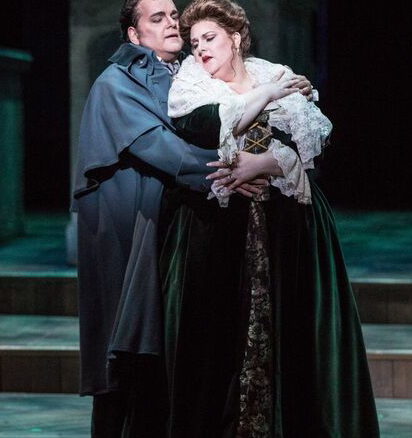
Rafael Davila and Tamara Wilson star in FGO’s production of Verdi’s “Un ballo in maschera” (A Masked Ball). Photo: Brittany Mazzurco
Opera lovers who have missed their Verdi in recent years at Florida Grand Opera can rejoice. The FGO production of Un ballo in maschera (A Masked Ball), which opened Saturday night at the Arsht Center, is a world-beater. First-rate singing, impassioned orchestral playing and a traditional but imaginative staging do full justice to this musically rich Verdi masterpiece.
Based on the assassination of King Gustav III at a masked ball in 1792, Verdi and his librettist Antonio Somma fashioned a romantic triangle with the king deeply enamored with Amelia, wife of his friend and confidant Count Anckarström (Renato in the Italian text). Although Amelia has remained faithful, the count joins the conspirators against the king, ultimately becoming his assassin. With his dying breath, the king pardons those who plotted against him. In this middle-period work, Verdi imbued the tale with an endless flow of melodic riches and orchestral and choral writing that transcend in complexity and depth his earlier successes.
In a cast that is strong from top to bottom, Tamara Wilson takes top honors. Winner of the coveted Richard Tucker Award in 2016, the soprano has both the creamy timbre that can caress Verdi’s melodic flights and thrilling high notes that rock the house. Wilson’s exquisitely floated pianissimos and dramatic projection turned “Ma dall’arido stelo divulsa” into a monologue of anguished passion. She phrased “Morrò ma prima grazia,” Amelia’s plea to her husband to let her see her son one last time, in one long-spun arc without losing dramatic intensity. Wilson vividly conveyed Amelia’s fraught dilemma between her love for the king and loyalty to her husband and aristocratic position. In duets with Rafael Davila’s Gustavo, she was nothing less than thrilling. Wilson is the full-blooded Verdi soprano opera buffs have been waiting for.
Davila’s virile tenor was in fine form. He brought just the right mix of dignity, vocal heft, subtlety and keen musicianship to Gustavo’s arias. Davila shaped the disguised monarch’s Barcarole with elegance and grace. Like Pavarotti, in Gustavo’s ditty he added a skeptical laugh at the soothsayer Ulrica’s prophecy of doom. Displaying reserves of stamina throughout the long and taxing role, Davila brought honeyed tones and pathos to the death scene and there was real chemistry and tension in his scenes with Wilson.
As Anckarström, Todd Thomas etched a vivid portrait of a loyal friend and husband turned traitor by jealousy and misplaced rage. “Eri tu” was the appropriate culmination of a cannily realized portrayal with Thomas’ warm and mellifluous baritone taking on just the right edge of angry malevolence. Dana Beth Miller was a frightening Ulrica with the rich voice to match, her low notes reaching contralto depths.
Elena Galván’s nimble coloratura and perky stage presence were captivating as Oscar, the king’s page. Prancing and dancing around the stage, seemingly immune to the unfolding tragedy at the king’s court, the vocally and physically agile Galván even turned a cartwheel during the curtain calls. Calvin Griffen (as Count Ribbing) and Alex Soare (as Count Horn) were the deep-voiced and sinister conspirators. Benjamin Werley and Nicholas J. Ward gave vocal strength to smaller cameos.
Ramon Tebar’s taut pacing maintained dramatic tension from the first bars of the prelude to the final curtain. This was red-blooded Verdi conducting, giving needed weight, instead of superficial lightness to the conspirators’ music. Orchestral textures were smooth and polished with particularly fine playing from the brass. Under director Katherine Kozak, the chorus was consistently full-voiced and vociferous, whether as courtiers, masked guests at the ball or Ulrica’s denizens.
The production utilizing the original Swedish setting instead of the Boston venue foisted upon Verdi by early censors. Director Marco Pelle drew vivid characterizations from each of the principals and turned the courtiers into a lively contingent through elegantly stylized choreography. With just a few additional props and platforms, Eric Fielding’s handsome multilevel unit set (from Utah Opera) served admirably as ballroom, graveyard gallows, the Anckarström’s home and Ulrica’s den. Howard Tsvi Kaplan’s period costumes were eye filling.
Lovers of Italian grand opera should not miss this Masked Ball, which gives us FGO’s finest Verdi production in many seasons.
Florida Grand Opera repeats Un ballo in maschera 2 p.m. Sunday and 8 p.m. Tuesday, Friday and Saturday at the Arsht Center in Miami and 7:30 p.m. May 11 and 13 at the Broward Center in Fort Lauderdale. Jonathan Burton and Alexandra LoBianco sing Gustavo and Amelia on April 30 and May 5 and 13. fgo.org; 800-741-1010.
Posted in Performances
Leave a Comment

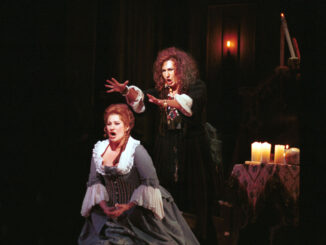
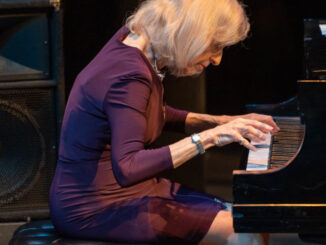
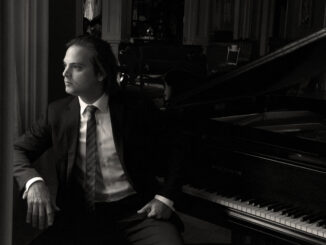
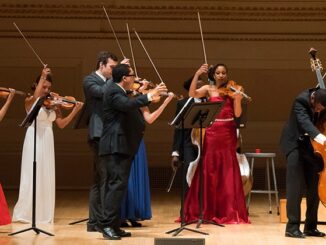
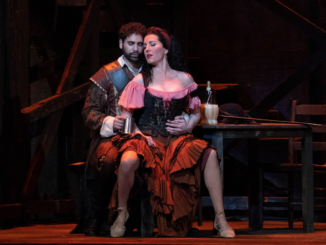
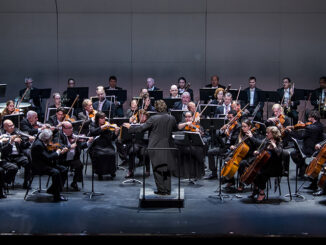
Be the first to comment